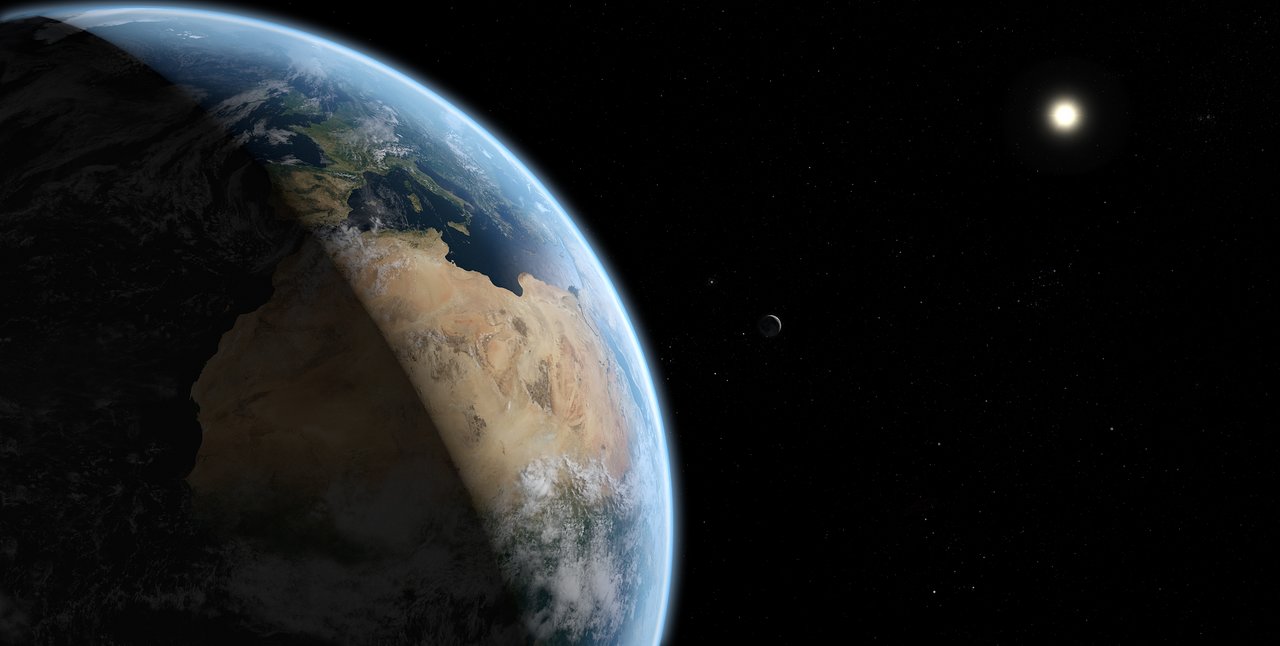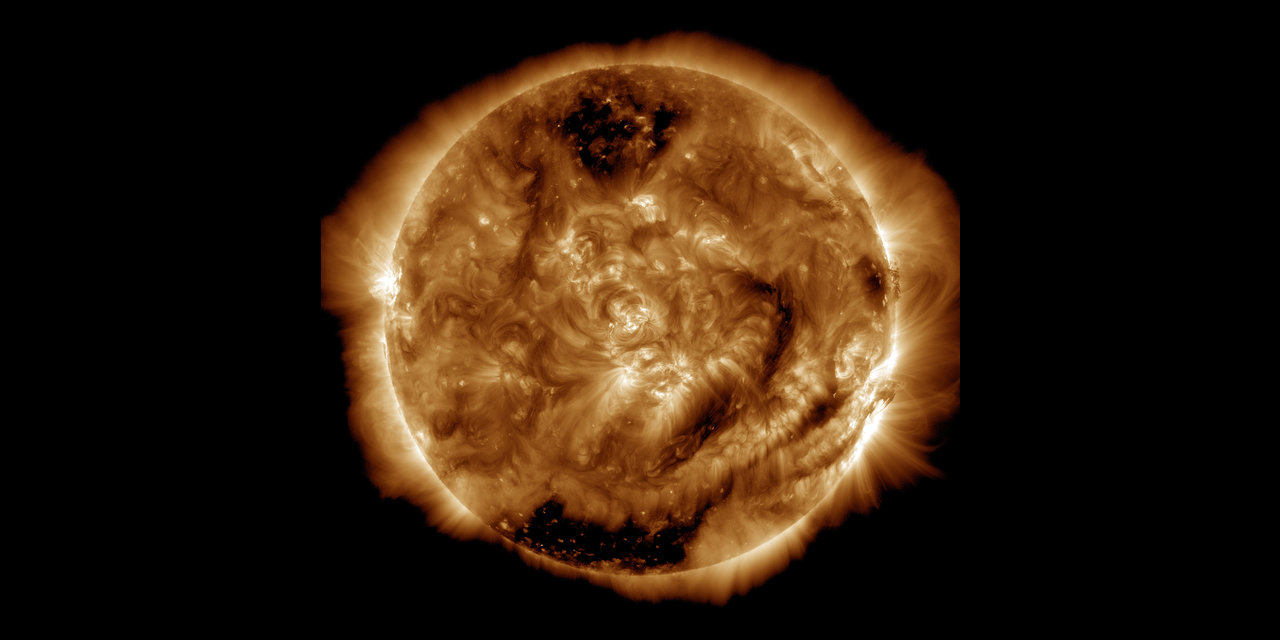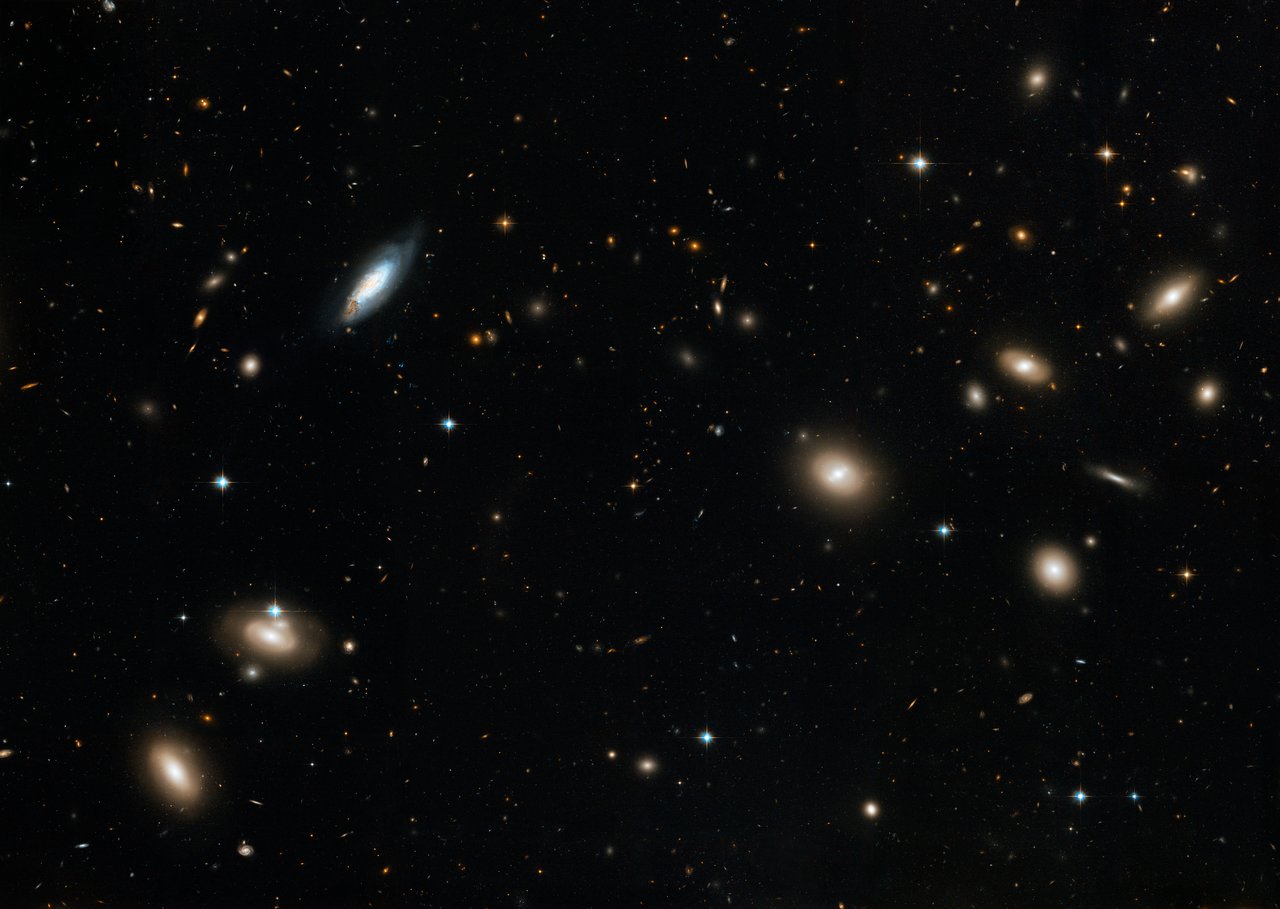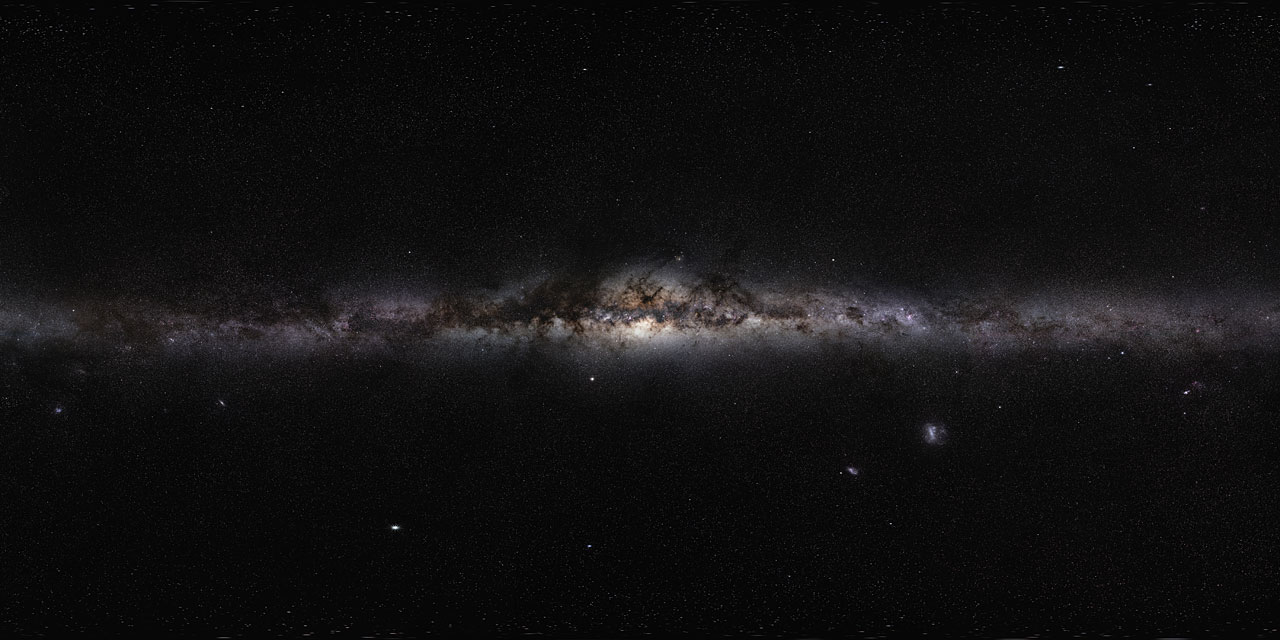Supernova Online-Ausstellung
01) Astronomie — Was ist Astronomie?
Die Astronomie ist eine Wissenschaft. Ihr Forschungsgebiet könnte nicht größer sein: Sie erforscht das gesamte Universum. Damit eröffnet sie uns einen neuen Blick, auch auf uns selbst. Durch astronomische Erkenntnisse erfahren wir mehr über unseren Platz in Raum und Zeit, was angesichts der Weite des Universums bescheiden macht.
- Von München zu den Galaxien (Wandbild)
- Warum erforschen wir das Universum? (Panel)
- Wie funktioniert Astronomie? (Panel)
- Wo ist unser Platz im Universum? (Panel)
- Wo ist unser Platz im Universum? (Touch)
- Wie haben frühere Zivilisationen den Nachtimmel gesehen? (Panel)
- Astronomie und Zivilisation (Touch)
- Welche Technologien verdanken wir der Astronomie? (Panel)
- Wie beeinflusst Astronomie die Gesellschaft? (Panel)
- Nach der Milchstraße greifen (Wandbild)
- Der Blick von unten (Panel)
- Lichter, nah und fern (Panel)

Credit: NASA, ESA, Harald Ebeling(University of Hawaii at Manoa) & Jean-Paul Kneib (LAM)
02) Erde, Mond & Sonne — Warum ist die Erde speziell?
Die Erde ist der einzige Planet, von dem wir wissen, dass es auf ihm Leben gibt. Unser großer Mond und die Bewegung der Erde um die Sonne in der genau richtigen Entfernung machen sie zu dem perfekten Ort für Leben, der sie ist.
- Der Adler ist gelandet! (Screen)
- Warum gibt es Tag und Nacht? (Panel)
- Warum gibt es Jahreszeiten? (Panel)
- Was wissen wir über den Mond? (Panel)
- Warum gibt es Mondphasen? (Panel)
- Wie entstehen Gezeiten? (Panel)
- Wie entstand der Mond? (Panel)
- Wieso gibt es Leben auf der Erde? (Panel)
- Könnten wir ohne Mond und Magnetfeld leben? (Panel)
- Mehr Wissen über Erde und Mond gewünscht? (Touch)
- Die andere Seite (Wandbild)
- Mond über der Atacama (Wandbild)

Credit: ESO/M. Kornmesser
03) Das Sonnensystem — Ist die Erde einmalig?
Die Erde ist einer von acht Planeten, die die Sonne umkreisen. Zum Sonnensystem gehören aber auch Monde, Asteroiden, Zwergplaneten und Kometen. Ist die Erde unter all diesen Himmelskörpern wirklich der einzige, der Leben ermöglicht?
- Woraus besteht unser Sonnensystem? (Panel)
- Wie bewegen sich Planeten? (Panel)
- Was ist die Sonne? (Panel)
- Was ist ein Planet? (Panel)
- Wie heiß ist es auf dem Merkur? (Touch)
- Was versteckt sich unter den Wolken der Venus? (Touch)
- Wie wurde die Erde zum blauen Planeten? (Touch)
- Gibt es Leben auf dem Mars? (Touch)
- Könnte es außerhalb der Erde leben geben? (Panel)
- Was unterscheidet Asteroiden und Kometen? (Touch)
- Wie beschützt uns Jupiter? (Touch)
- Woraus bestehen die Ringe des Saturn? (Touch)
- Warum ist Uranus gekippt? (Touch)
- Warum ist Neptun blau? (Touch)
- Wo endet das Sonnensystem? (Panel)
- Was ist mit Pluto (Touch)
- Mehr Infos über das Sonnensystem gewünscht? (Touch)

Credit: The International Astronomical Union/Martin Kornmesser
04) Sterne — Wie entstehen und sterben Sterne?
Sterne leben nicht ewig. Sie werden aus kosmischen Gaswolken geboren und können über einen Zeitraum von Milliarden von Jahren existieren. Aber am Ende sterben sie — entweder als verblassende Zwerge oder als gigantische Supernova-Explosionen. Astronomen haben ihre Lebensgeschichten enthüllt.
- Was sind Sterne? (Panel)
- Was ist die Lebensgeschichte der Sonne? (Panel)
- Wie weit weg sind die Sterne? (Panel)
- Wie weit weg sind die Sterne? (Touch)
- Warum leuchtet ein Stern? (Panel)
- Wie ist ein Stern aufgebaut? (Panel)
- Bestehen wir aus Sternenstaub? (Panel)
- Wie werden die Elemente erzeugt? (Touch)
- Wie werden Sterne geboren? (Panel)
- Wie entwickeln sich Sterne? (Panel)
- Wie wichtig ist Masse? (Touch)
- Können Sterne ihre Helligkeit ändern? (Panel)
- Wie sterben sonnenähnliche Sterne? (Panel)
- Schau, astronomische Nebel! (Touch)
- Wie explodieren Sterne? (Panel)
- Was sind schwarze Löcher? (Panel)
- Mehr Infos über Sterne gewünscht? (Touch)
- Sternenwiege (Wandbild)
- Von Katzen und Hummern (Wandbild)
- Schwanensee (Wandbild)
- Alles Gute zum Geburtstag, Hubble! (Wandbild)
- Stellares Leichentuch (Wandbild)
- Auftauchende Sterne (Wandbild)

Credit: NASA/SDO/AIA/LMSAL
05) Exoplaneten — Sind wir allein?
Die Erde ist ein Planet voller Leben. Auch andere Sterne werden von Planeten umkreist. Gibt es dort ebenso Leben? Und wie finden wir das heraus?
- Was ist ein Exoplanet? (Panel)
- Welche Arten von Exoplaneten gibt es? (Panel)
- Welche Exoplaneten gibt es? (Touch)
- Haben Exoplaneten Namen? (Panel)
- Wie bekommen Exoplaneten ihre Namen? (Touch)
- Welche Sterne haben Planeten? (Panel)
- Wie entstehen Planeten? (Panel)
- Wie bilden sich Planeten? (Panel)
- Können wir Exoplaneten sehen? (Panel)
- Wie werden Exoplaneten entdeckt? (Panel)
- Wie findet man Exoplaneten? (Touch)
- Welche Teleskope sind auf der Jagd nach Exoplaneten? (Panel)
- Was sind die berühmtesten Exoplanetenjäger? (Touch)
- Auf welchen Planeten kann es Leben geben? (Panel)
- Können wir die Atmosphäre von Exoplaneten einatmen? (Panel)
- Wo auf der Erde kann Leben existieren? (Panel)
- Wie häufig sind die Bausteine des Lebens? (Panel)
- Sind wir allein? (Panel)
- TRAPPIST-1 und seine drei Planeten (Wandbild)
- Mehr Wissen über Exoplaneten gefragt? (Touch)
- Unser nächster Nachbar (Wandbild)
- Schau, Exoplaneten! (Touch)
- Wie sehen Exoplaneten aus? (Panel)
- Können wir Exoplaneten besuchen? (Panel)

Credit: ESO/M. Kornmesser
06) ESO — Was ist die ESO?
Die Europäische Südsternwarte (ESO) spielt eine führende Rolle in der bodengebundenen Astronomie. Wie hat sie sich entwickelt? Und was ist das Besondere an Chile?
- Was ist die Europäische Südsternwarte? (Panel)
- Welche Länder gehören zur ESO? (Panel)
- Was tragen die Mitgliedsländer bei? (Touch)
- Wie fing alles an? (Panel)
- Wie wird die ESO geleitet? (Panel)
- Wer sind die Generaldirektoren der ESO? (Touch)
- Was sind die größten Entdeckungen der ESO? (Panel)
- Was sind ESO's größte Entdeckungen? (Touch)
- Warum sind die ESO-Observatorien in Chile? (Panel)
- Wie können wir in der Atacamawüste leben? (Panel)
- Warum besuchte James Bond die ESO? (Panel)
- Leben und Freizeit am Paranal (Screen)
- Beobachten am VLT (Screen)
- ESO Mitarbeiter bei der Arbeit und in der Freizeit (Screen)
- Nacht über der Atacama (Wandbild)
- Mehr Infos über die ESO gefällig? (Touch)
- Helle Nacht (Wandbild)

Credit: ESO/M. Kornmesser
07) Entdeckungsmaschinen — Was gibt es Neues an den ESO-Observatorien?
Auf La Silla, Paranal und dem Chajnantor-Plateau arbeiten die großen Teleskope und ausgefeilten Instrumente der ESO daran, die Mysterien des Universums zu enthüllen.
- Was ist La Silla? (Screen)
- La Silla (Wandbild)
- Was ist das VLT? (Screen)
- Paranal (Wandbild)
- Was ist ALMA? (Screen)
- ALMA und das Zentrum der Milchstraße (Wandbild)
- Kontrollraum — Live Beobachtungsdaten vom VST! (Screen)
- Kontrollraum - Wettersatellite (Screen)
- Kontrollraum - Wind und Seeing am Paranal (Screen)
- Kontrollraum - Datenreduktion (Screen)
- Kontrollraum - ESO Webcams (Screen)
- Kontrollraum - Virtuelle Tour durch Paranal (Screen)
- Kontrollraum - Virtuelle Tour durch ALMA (Screen)
- Chajnantor Panorama (Wandbild)
- Atacamawüste (Wandbild)
- Noch mehr Infos über die Observatorien der ESO gewünscht? (Touch)

Credit: ESO/B. Tafreshi (twanight.org)
08) Technologie — Wie untersuchen Astronomen das Sternenlicht?
Seit der Erfindung des Teleskops im Jahr 1608 bauen Astronomen immer größere Instrumente und verbessern stetig die verwendeten Technologien. Es sind Hightech-Entwicklungen nötig, um das Universum zu erforschen.
- Was ist Licht? (Panel)
- Linse oder Spiegel? (Panel)
- Welchen Vorteil haben Spiegel? (Touch)
- Wie funktioniert ein Teleskop? (Panel)
- Was, wenn das menschliche Auge nicht gut genug ist? (Panel)
- Warum brauchen wir Filter? (Panel)
- Was enthüllt infrarotes Licht? (Panel)
- Was enthüllt ultraviolettes Licht? (Panel)
- Wie können wir unsichtbares Licht sehen? (Panel)
- Carina Nebula (Image)
- Können wir das Universum hören? (Panel)
- Wie sieht das Universum im Röntgenbereich aus? (Panel)
- Wie sehen Astronomen Röntgenstrahlung? (Panel)
- Wie entdecken wir Teilchen aus dem Weltall? (Panel)
- Warum schicken wir Teleskope ins All? (Panel)
- Welche Weltraumteleskope gibt es? (Touch)
- Was ist mit Hubble? (Panel)
- Was ist so Besonderes an Hubble und James Webb? (Touch)
- Was haben Regenbögen und Spektroskopie gemeinsam? (Panel)
- Wie leistungsstark ist Spektroskopie? (Panel)
- Wie funktioniert Spektroskopie? (Touch)
- Wie entfunkeln Astronomen die Sterne? (Panel)
- Wie entfunkeln Astronomen die Sterne? (Touch)
- Wie können Teleskope zusammenarbeiten? (Panel)
- Wie funktioniert Interferometrie? (Touch)
- Mehr Wissen über Technologie gefragt? (Touch)
- Combining colours (Image)
- The invisible made visible (Image)
- The VLTI lab (Image)
- Technological wonder (Image)
- Sunset line-up (Image)
- X-ray vision (Image)
- Power times four (Panel)

Credit: ESO/M. Kornmesser
09) ELT — Was ist das ELT?
In dem nie endenden Streben, einen noch besseren Blick auf das Universum zu erlangen, bauen Astronomen und Ingenieure der ESO nun das Extremely Large Telescope. Mit einem Hauptspiegel von 39 Metern Durchmesser wird das ELT das bei Weitem größte optische Teleskop sein.
- Was ist das ELT? (Panel)
- Wann wird das ELT fertig sein? (Panel)
- Was sind die Meilensteine des ELT? (Touch)
- Was wird das ELT erforschen? (Panel)
- Wie baut man einen 39-Meter Spiegel? (Panel)
- Armazones und der Supermond (Wandbild)
- Rund um Armazones (Panel)
- ELT Live Webcam (Screen)
- Welche Instrumente wird das ELT benutzen? (Panel)
- Sind noch weitere Riesenteleskope geplant? (Panel)
- Gibt es Pläne für noch größere Teleskope? (Panel)
- Mehr Infos über das ELT gewünscht? (Touch)
- Aufsteigende Sterne (Wandbild)
- Riese der Zukunft (Wandbild)

Credit: ESO
10) Galaxien — Ist unsere Milchstraße einmalig?
Alle Sterne am Nachthimmel sind Teil unserer Heimatgalaxie, der Milchstraße. Im Universum gibt es allerdings noch Billionen weitere Galaxien.
- Was ist eine Galaxie? (Panel)
- Woher wissen wir von anderen Galaxien? (Panel)
- Was ist unsere kosmische Heimat? (Panel)
- Wie sieht die Milchstraße aus? (Panel)
- Wie ist die Milchstraße aufgebaut? (Panel)
- Was sind die Komponenten der Milchstraße? (Touch)
- Was ist zwischen den Sternen? (Panel)
- Was versteckt sich im Zentrum der Milchstraße? (Panel)
- Wo in der Milchstraße ist Leben möglich? (Panel)
- Milchstraße in neun Milliarden Pixeln (Wandbild)
- Wie treiben Schwarze Löcher Quasare an? (Panel)
- Welche Formen haben Galaxien? (Panel)
- Welche Unterschiede gibt es zwischen Galaxien? (Panel)
- Welche Arten von Galaxien gibt es? (Touch)
- Galaktischer Zensus (Wandbild)
- Wie entwickeln sich Galaxien? (Panel)
- Was treibt die Entwicklung von Galaxien an? (Touch)
- Verändert sich die Zusammensetzung von Galaxien? (Panel)
- Wie sind Galaxien im Weltraum verteilt? (Panel)
- Gibt es größere Strukturen als Galaxien? (Touch)
- Was ist eine Gravitationslinse? (Panel)
- Wie funktionieren Gravitationslinsen? (Touch)
- Klassifiziere Galaxien! (Touch)
- Mehr Infos über Galaxien gewünscht? (Touch)
- Heimatgalaxie (Wandbild)
- Zerstörung und Erschaffung (Wandbild)
- Wunderschöne Andromeda (Wandbild)
- Verzerrter Blick (Wandbild)
- Entfernungen überbrücken (Wandbild)
- Gewundene Schönheit (Wandbild)

Credit: NASA, ESA, and the Hubble Heritage Team (STScI/AURA).
Acknowledgment: D. Carter (Liverpool John Moores University) and the Coma HST ACS Treasury Team.
11) Kosmologie — Woher kommen wir, wohin gehen wir?
Vor 13,8 Milliarden Jahren entstand das Universum mit dem Urknall. Seitdem dehnt es sich aus. Galaxien, Sterne, Planeten und Leben wurden geboren. Über die Vergangenheit des Universums wissen wir schon viel, seine ferne Zukunft ist uns unbekannt.
- Geschichte des Universums (Wandbild)
- Wie begann das Universum? (Panel)
- Was wissen wir über den Urknall? (Touch)
- Wie ist das Universum so schnell gewachsen? (Panel)
- Wie bildeten sich die ersten Elemente? (Panel)
- Können wir das Glühen des Urknalls sehen? (Panel)
- Hinweise auf den Urknall (Wandbild)
- Wann begann das Universum zu leuchten? (Panel)
- Wann bildeten sich die ersten Sterne? (Panel)
- Wann entstand das Sonnensystem? (Panel)
- Wie wird das Universum enden? (Panel)
- Wo in der Zeit sind wir? (Wandbild)
- Wie messen Astronomen Entfernungen? (Panel)
- Welche kosmischen Maßbänder gibt es? (Touch)
- Was sind die Grundlagen unseres Universums? (Panel)
- Den Kosmos simulieren (Wandbild)
- Woraus besteht das Universum? (Panel)
- Wo befindet sich das Zentrum des Universums? (Panel)
- Mehr Wissen über Kosmologie gewüscht? (Touch)

Credit: Illustris Collaboration
12) Kosmische Mysterien und Bedrohungen — Was sind die großen Unbekannten?
Wir haben viel über das Universum gelernt. Es gibt aber immer noch viele Unbekannte. Eine davon ist, wie und ob Leben auf der Erde den Bedrohungen aus dem Weltraum standhalten kann.
- Schneller als das Licht! (Wandbild)
- Was wissen wir über das dunkle Universum? (Panel)
- Was ist Antimaterie? (Panel)
- Was passiert wenn man in ein Schwarzes Loch fällt? (Panel)
- Wie ähnlich ist uns außerirdisches Leben? (Panel)
- Existieren Wurmlöcher? (Panel)
- Gibt es nur ein Universum? (Panel)
- Können Asteroiden alles Leben vernichten? (Panel)
- Was passiert, wenn die Sonne stirbt? (Panel)
- Können Gammastrahlenausbrüche alles Leben beenden? (Panel)
- Wie gefährlich sind Supernovae? (Panel)
- Könnte ein Schwarzes Loch die Erde verschlucken? (Panel)
- Könnten wir das Ende des Universums überleben? (Panel)
- Überlebt das Leben auf der Erde den Menschen? (Panel)
- Mehr Wissen über kosmische Mysterien gewünscht? (Touch)
- Was sind Gravitationswellen? (Panel)
- Versteckter Schatten (Panel)
- Auf Wiedersehen! (Panel)
- Weltraumzucker (Wandbild)
- Blick in die Zukunft (Wandbild)
- Stellare Gammastrahlenexplosionen (Wandbild)
- Stetiger Beschuss (Wandbild)
- Expandierende Schockfront (Wandbild)

Credit: NASA, ESA, Harald Ebeling (University of Hawaii at Manoa) & Jean-Paul Kneib (LAM)
